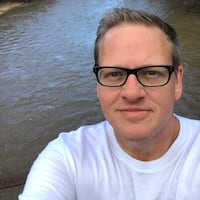This past summer, two of Atlanta's musical titans met in a local studio.
Producer Brendan O'Brien and heavy rock quartet Mastodon came together to craft the follow-up to Mastodon's Grammy-nominated "Blood Mountain."
O'Brien is best known, at least in recent years, for his work on Bruce Springsteen's three most recent albums of original material (excluding "We Shall Overcome: The Seeger Sessions," his 2006 tribute to Pete Seeger). In the '90s, O'Brien made a name for himself as the post-grunge go-to guy, producing albums by Pearl Jam, Stone Temple Pilots, Rage Against the Machine and Korn, along with more introspective work by musicians such as Aimee Mann.
In less than a decade, Mastodon has become one of progressive heavy metal's most revered bands, winning album of the year honors from Kerrang magazine — Britain's hard rock weekly — for 2004's "Leviathan" and a best metal performance Grammy nomination for "Colony of Birchmen" from "Blood Mountain," the band's 2006 major label debut for Warner Bros.
Last month, as the band was putting the finishing touches on the still untitled album at northeast Atlanta's Southern Tracks studios, we got a sneak preview of three songs before sitting down with Mastodon drummer Brann Dailor to talk about the band's history, the new album and all the things he misses about Atlanta when Mastodon is on the road.
Q: How did Mastodon come together?
A: Bill [Kelliher, guitarist] and I moved here Jan. 1, 2000. Bill's girlfriend, now wife, lived here. We had been playing in bands together since about '93. We lived in Rochester [N.Y.], played in a band called Lethargy. Lived in Massachusetts, played in a band called Today Is the Day there and did a bunch of touring. We were eager to start a new project in Atlanta, because we had quit Today Is the Day and Bill wanted to be with his girlfriend. And Bill was like "why don't you come with me?" We moved down here and within two weeks we met Brent [Hinds, guitarist] and Troy [Sanders, bassist and vocalist]. We knew from the first meeting that we had something musically that was special. Three months later, we piled into a van and started touring, and we haven't stopped since.
Q: How has the Atlanta scene treated you?
A: It was pretty immediate, you know. We had the full support of the underground community that was happening in Atlanta. All our shows that we played when we first started out — the Star Bar, the EARL— were packed to the gills. It was awesome. Atlanta treated us right. They still do.
Q: How did you come to work with Brendan?
A: Oddly enough, through Bruce Springsteen and [E Street Band drummer] Max Weinberg. Max Weinberg's son, Jay, is a big music fan, and he started coming to our shows a few years back. We'd see him in the front row going crazy — he was like 15 years old — and him and his dad would come out.
When Bruce came through town a few months ago, we talked to Max, and Max said, "We're going to be in the studio a couple of days beforehand with Brendan O'Brien." And I was like, "I know that name." At that moment, we didn't know what we were going to do, because the guy we were going to work with fell through. He couldn't do the record until September. We'd taken the songs as far as we could take them. We were ready to record this record.
So we went to the Bruce Springsteen show and met Brendan briefly. Went down and met Bruce and he looked at me and said, "I've been producing my own records for years and this is the only person I've met that I would trust with my music. I love working with Brendan." So, I was like, "OK, you're the Boss." I didn't really need a stamp of approval because of Brendan's track record ... I knew the material that we'd come up with was almost classic-rock sounding, or a classic-rock version of ourselves. It doesn't sound like Creedence Clearwater Revival or Boston, but a version of that told through us. So we thought it would be interesting to work with Brendan, if he'd have us. His roster was pretty intimidating. But he got the demos and it was, "I love them. I want to meet you guys."
We met at Aurora Coffee over in Little Five Points and had an hour-and-a-half-long conversation ... We were on exactly the same page and we were like "OK, let's make a record."
Q: I hesitate to say that it sounds more mainstream, but it seems like the new stuff might be more accessible to more people.
A: It's still us and it's still kind of weird, but I'm hoping it will be one of those things that transcends. It's not what you're used to hearing, but it's likable. Enough to be like " I really like that, but I don't really know what to compare it to. But it sounds nice. And I want to hear it again." We're hoping that happens.
But when all is said and done, we totally love this record. We're more excited about this album than we have been about any piece of art that we've made together and that's all we really need to come out of this with, regardless of how successful or popular this album is. As soon as you start trying to chase what you think somebody wants to hear, that's the wrong path. You need to please yourself. It's a completely self-indulgent art form.
About the Author
Keep Reading
The Latest
Featured


